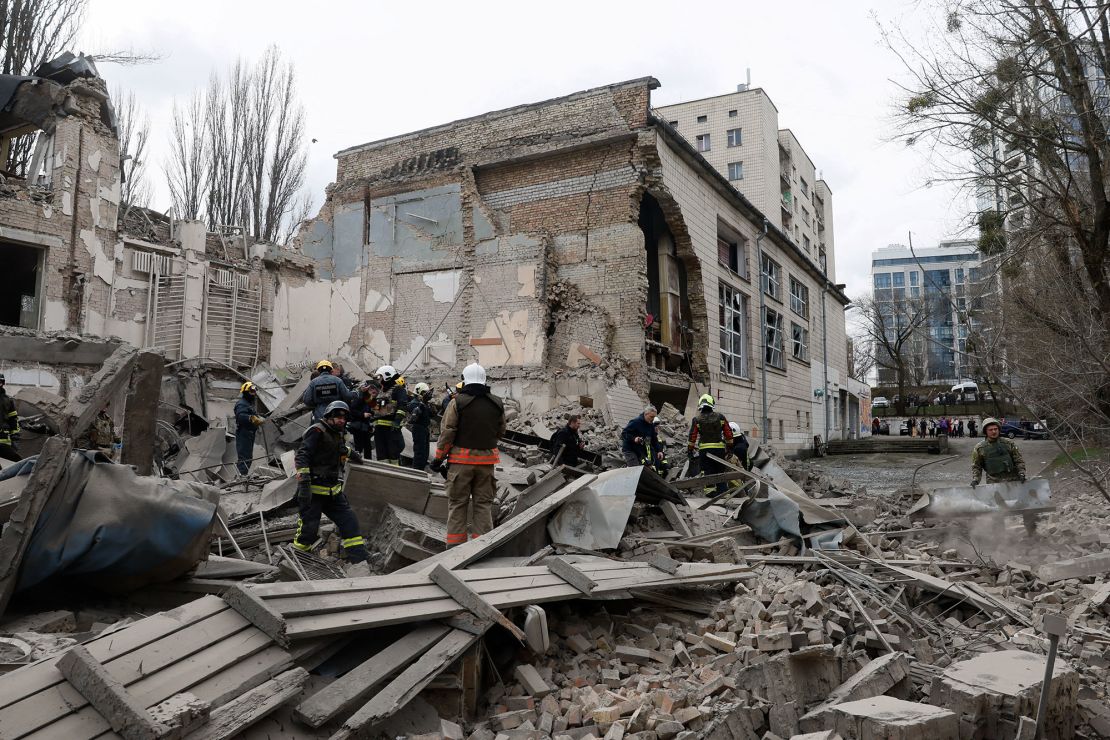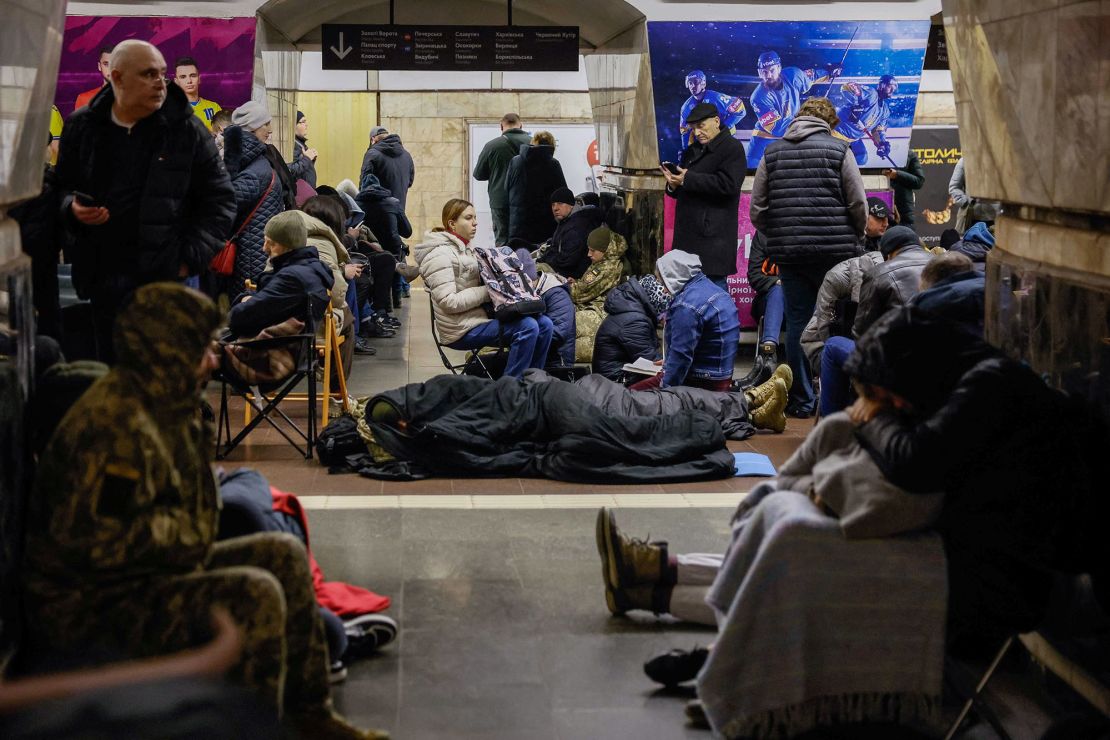Opinion: The heroism of Ukraine and the nihilism of Mike Johnson | CNN
[ad_1]
Editor’s Note: Amelia Glaser is professor of literature at UC San Diego. Her books include “Jews and Ukrainians in Russia’s Literary Borderlands.” Marci Shore is professor of modern European intellectual history at Yale University and the author of “The Ukrainian Night: An Intimate History of Revolution,” among many others. The views expressed in this commentary are their own. Read more CNN Opinion.
Kyiv
CNN
—
Late morning Monday, from occupied Crimea, the Russians launched two hypersonic ballistic missiles at Kyiv. Our friends heard the explosion and the air raid sirens simultaneously — which is unusual. Hypersonic missiles are faster than the speed of sound.
Fragments hit the Academy of Decorative and Applied Arts and Design, where the students, with no time to get to the shelter, lay down on the ground.
Kyiv is dependent on air defense. In turn, air defense is dependent on American aid, and that aid is currently hostage to House Speaker Mike Johnson, who is at the moment among Russian President Vladimir Putin’s most powerful allies.
We are American Slavicists and have just returned from Kyiv. It’s not easy to get there these days. The trip takes at least 36 hours from New York. We took an overnight flight from JFK to Warsaw — where the war does not feel far away. From Warsaw we rode four hours by train to the Polish border city of Chelm. And from Chelm we rode another 13 hours to the Ukrainian capital, in a Ukrainian train that arrived precisely on time.
Neither of us had been to Kyiv since shortly before Covid shut down the world.
“Did you hear how Covid ended?”– goes the Ukrainian joke.
“Boom! Boom! Boom!”
Our colleagues at the Kyiv School of Economics wanted us to feel safe, so they hired Andrii, a tall, retired police officer, to be our security consultant. He advised us to install two air-raid apps, and to keep track of missiles’ location on Telegram.
On Sunday evening we were on our way back to Kyiv from Bucha, the Kyivan suburb where Russian forces carried out a massacre in March 2022, when the first alert showed up on our phones.
“It’s OK,” Andrii texted, “the missile is on the other side of the city. Text me when you’re home safely.”

In Ukraine the air raid alerts are incessant. The missiles keep coming. Everyone has lost someone. But Kyiv is thriving in its own way. In the center of the city a new bookstore called Sens has a large Ukrainian literature section and a well-lighted cafe serving quinoa salad with avocado. There are chic coffee houses, and a Crimean Tatar restaurant with fabulous beet meze and babaganoush.
There are two retrospective exhibits featuring the late Ukrainian New Wave painter Oleksandr Roytburd. One of them has a constant line winding out of the Pinchuk gallery and across the street towards the Bessarabka market. Roytburd succumbed to cancer, complicated by Covid, in 2021.
The monumentalist painter Alla Horska was killed in 1970, most likely by the KGB. Her first retrospective is now open at the Ukrainian House, a cavernous Soviet-era exhibition hall near the city center. When an air raid siren went off, the exhibit guide encouraged the visitors to relocate to the bomb shelter: “There is a concession stand and bookstore on the basement floor. Please go down and have a cup of coffee.”
At the Kyiv School of Economics, Tymofiy Mylovanov, the school’s president and Ukraine’s former trade minister, showed us the underground lecture rooms to which we would relocate in case of an air raid alarm. In public sessions at KSE, Amelia spoke with the poets Iya Kiva and Olena Huseinova about the untranslatability of war, and the urgency of translating despite its impossibility.
Marci spoke with the philosophers Tetyana Ogarkova and Volodymyr Yermolenko about Grenzerfahrungen – “boundary experiences.” What happens when the edge becomes the center? In academic discussion death was once a metaphor – the death of metaphysics, the death of the author. Now death is no longer a metaphor. The overflowing audience stayed for over two hours to think about philosophy and war.
This February, Putin bragged to Tucker Carlson about the 1654 Pereiaslav Treaty between the Cossack leader Bohdan Khmelnytsky and Muscovy. This treaty, he claimed, gave Russia the right to control contemporary Ukraine. Even Carlson seemed surprised at the anachronism.
Khmelnytsky is a Cossack leader remembered as a nation-builder in Ukraine, as a unifier in Russia, as a traitor in Poland. Jews remember him as an instigator of pogroms. In a discussion at the Kyiv Fulbright offices about Khmelnytsky’s disparate legacies, the historian Oleksandr Halenko thought Amelia, a Jewish studies scholar, had glossed too quickly over the pogroms. “Were you just being polite?” he wanted to know. Ukraine, fighting for its survival, is also rethinking its historical icons.
In Kyiv, everyone is used to the war. They do not–cannot–ignore it, but they are habituated to a rhythm of life shaped by curfews and air raids that can interrupt everything at any moment. They know that debates about whether the West could have pacified Putin by reassuring him that NATO would never expand or whether Ukraine should now raise a white flag and negotiate make little sense.
Putin and his allies have embraced a practice of destruction seemingly for the sake of destruction. And Ukrainians know that neither negotiation nor surrender is possible. They are determined to keep living.

At 12:49 a.m. on Thursday March 21, Andrii texted us a message prefaced with a red exclamation point: “Reconnaissance groups report the taking off of 10 Tu-95s from the Olenya air base. Do not ignore the air raid alarm!”
Two minutes later he texted again: “Most likely between 5 and 6 am there will be a massive rocket attack. In the event of an alarm, go to the shelter.”
The two of us are humanities professors, not security specialists. We googled Tupolev, or Tu-95: it was a large turboprop-powered bomber, designed in the 1950s to carry multiple missiles at once across great distances. Russia used them in Syria in 2016. Now they were being launched from the Olenya airbase, south of the Russian city of Murmansk.
The air raid siren came at 3:21. We put on our shoes, grabbed our jackets and phones and went down to the underground parking garage repurposed as the hotel’s bomb shelter. Phones lit up the garage. Everyone was following the Telegram channels with crowd-sourced news.
Marci’s former student, Sergii, texted on a group chat: “sitting in the corridor, between the walls.” His friend responded: “please go to the bomb shelter.” There are levels of choice: stay in bed; go into the bathtub, or the corridor, or the basement bomb shelter, or the metro stations – which are deeper. Built in the 1950s with the intention of doubling as shelters in the event of a NATO attack, they are the safest option. Sergii sent screen shots from the Telegram channels he followed: “don’t relax. a second wave is coming in fifteen minutes.”

Sergii’s sister heard the explosions at 5.00 a.m. and then went back to sleep. She had decided to take her chances. “healthy sleep=healthy psyche,”she texted.
We stayed in the bomb shelter while 31 missiles reached Kyiv oblast. The alert ended at 6:10 a.m., after 2 hours and 49 minutes. Everyone’s apps then announced in unison: “ATTENTION! THE AIR ALERT IS OVER. MAY THE FORCE BE WITH YOU!”
All air raid alerts end with “May the force be with you!” Mark Hamill–alias Luke Skywalker has been doing outreach for Ukraine.
A woman at a kiosk asked what we thought of the barrage. “I waited in the bathroom,” she said. “The metro’s too far and I don’t have a basement.”
That morning Ukrainian air defense shot down all 31 Russian cruise and ballistic missiles. Andrii showed us photos, taken from his apartment window, of the defense rockets reaching their targets. Over a dozen people were injured on the outskirts of Kyiv, when shards of the intercepted missiles fell; some buildings were damaged and there are large craters in the ground.
Kyiv has the best air defense in Ukraine; the country lacks the resources to defend other cities this way. These other cities have not fared as well.
Before dawn on Thursday alone, Russia – a country where millions of citizens are too impoverished to have indoor plumbing — spent some $390 million firing missiles at Ukraine, according to Agiya Zagrebelska, head of sanctions policy at the National Agency on Corruption Prevention. The nihilism of it is staggering.
“How many schools could you build with the equivalent of the money…?” Arad Benkö, the Austrian ambassador to Ukraine, texted us.
“Pessimists don’t win wars,” Admiral Rob Bauer, chair of the NATO military committee, said to the audience at the Kyiv Security Forum a few hours later. He noted that Ukrainian air defense had done a spectacular job that morning intercepting every single missile launched at Kyiv.
“There is nothing you cannot do,” Bauer told Ukrainians, “the only thing you need is our help.”
But renewed help has not been forthcoming. The United States has essentially cut off Ukraine, and Ukrainian air defense is quickly running out of ammunition. It is a matter of weeks – or days – before it will be gone.
Get Our Free Weekly Newsletter
“I’m glad you came when you did,” the literary translator Iaroslava Strikha told us. “In a couple of weeks we may not have the defense missiles to keep Kyiv safe.”
Mike Johnson, beholden to Donald Trump, who has praised Putin, is holding 42 million people in Ukraine hostage. Across Ukraine children are continually buried under rubble, killed by the Kremlin’s barrage of missiles.
Ukrainians know their lives depend on whether or not Johnson brings the National Security Supplemental to the House floor. Poles, Lithuanians, Latvians and Estonians know that their lives, too, depend on this: they know that the war could cross their borders at any moment, and that the Ukrainians are fighting for them as well. And the French and Germans, too, are slowly coming to understand that we are a hair’s breadth from the third world war.
At the opening of the Security Forum former Ukrainian Prime Minister Arseniy Yatsenyuk addressed Johnson: “The world is watching you. And you’re a devout Christian, Mr. Speaker, so God is watching you, too.”
Putin, with his oil money, has many more military resources than Ukraine does. He has, moreover, no qualms about running through the entirety of Russia’s national wealth – or bleeding through the entirety of its population. When other people’s lives mean nothing to you, you have a free hand.
After we landed back in JFK, we turned off the air raid sound on our phones. But we haven’t deleted the app.
[ad_2]
Read Nore:Opinion: The heroism of Ukraine and the nihilism of Mike Johnson | CNN

Comments are closed.